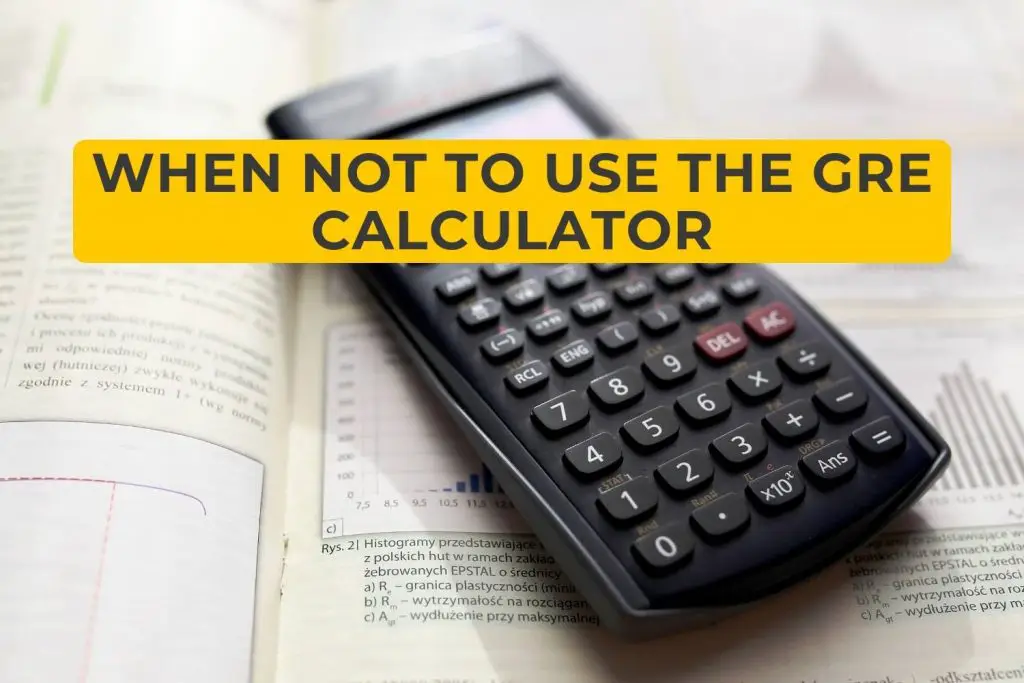The GRE might not be as hard as the MCAT or the LSAT, but it’s still an intimidating test. It requires many hours of studying and carries a lot of weight in your admission to graduate schools.
Seeing how important the GRE is, you might be wondering if you can use a calculator for the test. After all, you want all the help you can get.
The good news is, yes, you can use a calculator. But there’s more to the story.
Read this guide for a comprehensive answer to the question “Can you use a calculator on the GRE?”
Can You Bring Your Own Calculator to the GRE?

It’s a relief to hear that you can use a calculator on the GRE. But you should know that you can’t bring your own.
Test-takers must use the GRE’s on-screen device. While it’s better than nothing, you might feel frustrated that you can’t put your fancy TI-83 Plus to work.
In fact, you should leave all of your personal calculators at home. The GRE forbids you from bringing any electronic devices into the testing center. If a test administrator happened to discover one in your possession, they would dismiss you from the room and cancel your score. You might also want to check out our How Long Does it Take to Get & Send GRE Scores for more information.
This scenario is not only embarrassing, but it also forces you to waste money on rescheduling. So, make sure you are calculator-free on test day.
What Does the GRE Calculator Look Like?
When you realize that the GRE calculator is all you can use, you probably want to know what it looks like.
Test-takers can get an idea by opening up the Calculator app on a Windows computer. You might get excited by the versatility it offers. But, before you get your hopes up, realize that the GRE version is pretty much the equivalent of the Standard mode. You won’t get access to the features in the Scientific, Graphing, and Programmer modes. Basically, all the GRE calculator can do is simple arithmetic.
It is bare-bones because the test is trying to test your quantitative reasoning and critical thinking. If you had access to graphing features or trig functions, you wouldn’t be able to demonstrate these skills.
Wondering why you get a calculator at all, especially when it’s so basic? It’s because the GRE doesn’t care about how well you can add and subtract. It helps you with arithmetic that is too tedious to do by hand, allowing you to dedicate brain power to what really matters.
Should You Use the GRE Calculator?

We’ve answered the question, “Can you use a calculator on the GRE?” Now, you might be wondering if you SHOULD.
To some, this inquiry might seem absurd. Why wouldn’t you use a tool that can help you get the right answers?
Unfortunately, the GRE calculator might end up being your ball and chain. The interface is somewhat antiquated and clunky. Additionally, some test-takers find that the tool’s on-screen placement gets in the way.
Due to the its less-than-ideal design, it can drastically slow you down. Messing with it takes time away from you completing problems. And, due to the not-so user-friendly nature, you may even punch in typos that can lead to critical mistakes.
So, with these limitations in mind, we recommend using the GRE calculator sparingly. See the sections below for more details.
When to Use the GRE Calculator
The GRE calculator will prove useful for complex arithmetic. The tool comes in handy for problems involving the following:
- Ratios
- Odd decimals
- Square roots
For instance, say you need to figure out the square root of 12 to the nearest hundredth. Seeing as there’s little chance you can quickly do the math by hand, you’ll want to use your handy tool.
See also our How Hard Is The GRE here for you to have an idea.
When Not to Use the GRE Calculator

We all know what 2 x 2 is, but the temptation to double-check is real. To save time, you should resist the urge to use your calculator for simple arithmetic. Relying on memory and mental math will be a huge advantage.
Find the difference between the GRE vs LSAT here.
Can You Use a Calculator on the GRE — The Bottom Line Become Familiar With the GRE Calculator
Yes, you can use a calculator, but you can only use the one that the GRE provides.
Become familiar with the tool by taking prep courses and practice tests. These resources have versions with slightly different designs, but the functions are the same across the board.
The more you practice, the better you’ll become at navigating the clunky interface. You’ll also improve at understanding when you should and shouldn’t rely on this tool. Remember that while it can be helpful, it can also slow you down. Start your repetitions and use this guide to develop the best GRE calculator strategies!

